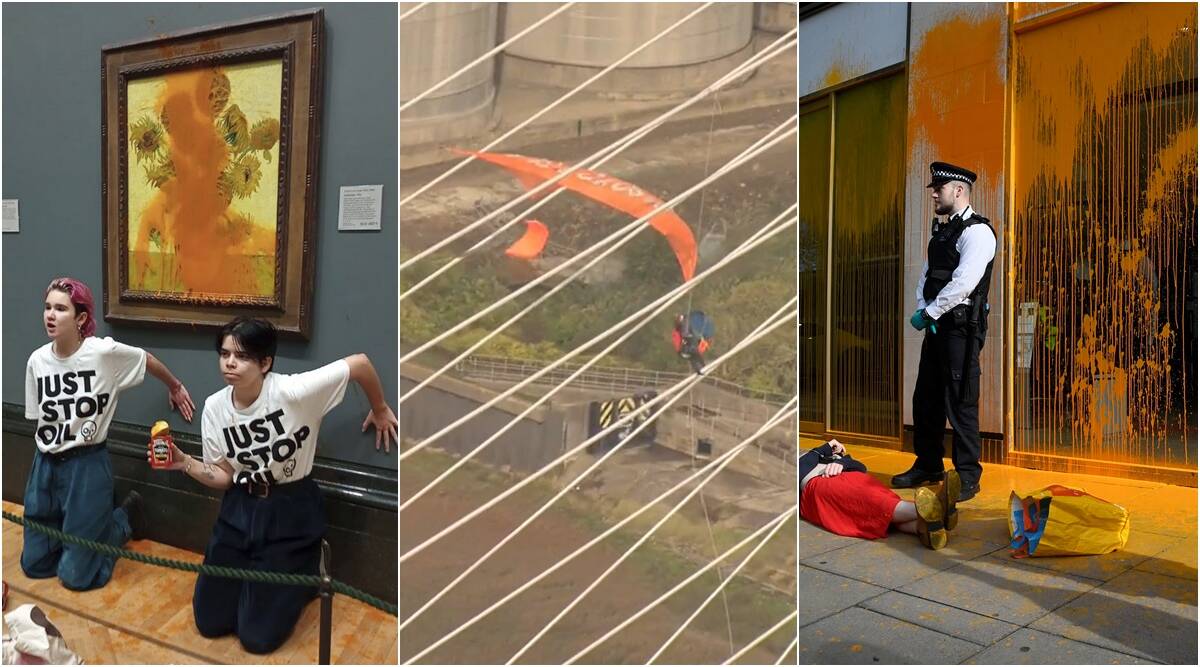 One needs to remember that Van Gogh painted his Sunflowers for many reasons, as his letters show, but among them was gratitude — a tender work that came from a man who grappled with his mental health. Tomato Soup x Sunflower is the meeting of the worst that we are capable of with the best that we are capable of. (Photos via agencies)
One needs to remember that Van Gogh painted his Sunflowers for many reasons, as his letters show, but among them was gratitude — a tender work that came from a man who grappled with his mental health. Tomato Soup x Sunflower is the meeting of the worst that we are capable of with the best that we are capable of. (Photos via agencies)“Grub first, then ethics.”
– Bertolt Brecht
When Just Stop Oil activists threw a can of tomato soup on Vincent van Gogh’s Sunflowers last week, one of them proclaimed, “What is worth more, art or life?… Are you more concerned about the protection of a painting or the protection of our planet and people?”
On the surface, it looks like an apples-and-oranges situation. We shouldn’t have to choose between saving our world and saving our art. Yet, the inescapable truth is that we live in an emergency in which our every action either hastens or delays the irreversible destruction of this world. We are asked to choose every day. Is that coffee takeaway (cup, lid, sleeve, sugar sachet, stirrer, sleeve, napkins) better than bringing a reusable coffee mug? Should Big Oil cut profits or pollute more? This or that? Art or life?
The number of artworks and foods that have become unwitting collaborators in climate activism increases by the day. On Sunday, two protesters from a German environmental group threw mashed potatoes on Claude Monet’s Les Meules. In the style of Just Stop Oil, these protesters shouted, “We are in a climate catastrophe and all you are afraid of is tomato soup or mashed potatoes on a painting…I’m afraid because science tells us that we won’t be able to feed our families in 2050…This painting is not going to be worth anything if we have to fight over food.”
Your child drawing a flower at play school is art but art is also a luxury commodity that is traded for top bucks among billionaires, some of them oil barons. We are baffled by the astronomical prices that artworks command, so somewhere we know that their value is artificially created. Therefore “What is worth more, art or life?” is not a question for the world’s richest dynasties. They will get to have their art and eat, too. They won’t have to choose.
Art prices are often driven up by their singularity—even if Van Gogh made quite a few sunflower-themed paintings, each is valued at tremendous prices (in 1987, one of them sold in an auction for nearly $40 million, roughly $100m today). Unlike a prized car, artworks don’t always have limited editions but are an edition of one —just like our planet. But while we are able to see the instantaneous destruction of paintings (to be clear, in all these cases, the works were behind glass but the frames were hit in varying degrees), we are unable to fathom climate change in all its daily, horrifying detail. The signs are all around us — changing weather patterns and increasing intensity of weather conditions, all of which affect our crops and ecosystems — but we are more shocked about a potential threat to a painting than to our very lives.
The artist Beeple, known for his NFTs, responded to the attack on Sunflowers with a work that showed the activists with heads of clown emojis and taking selfies in front of the work, as if to say that they are seeking nothing but attention. Every once in a while there will be a documentary or an actor who will say something about climate change and for a brief moment, we will remember that our lives and the lives of our children are in peril. But we quickly fall back into old ways. When domestic foods are hurled like Molotovs on artworks — almost Warholian in their disregard of the art greats — climate change is back in the headlines.
One needs to remember that Van Gogh painted his Sunflowers for many reasons, as his letters show, but among them was gratitude — a tender work that came from a man who grappled with his mental health. Tomato Soup x Sunflower is the meeting of the worst that we are capable of with the best that we are capable of.
Yet, despite this apocalypse that the climate prophets are warning us about, one can’t help but wonder if, in our moments of utter despair, where we will seek solace if not for an embrace, a kind word—and art. It may not be a Monet, but there will always be a song for the weary or a photograph of a place we loved—the very things we call art. In the dark times, there will be singing. We may be singing about the dark times, but ultimately, we will be singing and making art. Sure we need food, but art is the stuff of the imagination. Both are essential for survival.
“Art-or-life” is one choice we shouldn’t have to make and, ironically, if we pay heed to these activists, we won’t have to in the future.
benita.fernando@expressindia.com